- Home
- Toni Morrison
Mouth Full of Blood
Mouth Full of Blood Read online
Mouth Full of Blood
Essays, Speeches, Meditations
TONI MORRISON
Contents
Peril
Part I THE FOREIGNER’S HOME The Dead of September 11
The Foreigner’s Home
Racism and Fascism
Home
Wartalk
The War on Error
A Race in Mind: The Press in Deed
Moral Inhabitants
The Price of Wealth, the Cost of Care
The Habit of Art
The Individual Artist
Arts Advocacy
Sarah Lawrence Commencement Address
The Slavebody and the Blackbody
Harlem on My Mind: Contesting Memory—Meditation on Museums, Culture, and Integration
Women, Race, and Memory
Literature and Public Life
The Nobel Lecture in Literature
Cinderella’s Stepsisters
The Future of Time: Literature and Diminished Expectations
Interlude BLACK MATTER(S) Tribute to Martin Luther King Jr.
Race Matters
Black Matter(s)
Unspeakable Things Unspoken: The Afro-American Presence in American Literature
Academic Whispers
Gertrude Stein and the Difference She Makes
Hard, True, and Lasting
Part II GOD’S LANGUAGE James Baldwin Eulogy
The Site of Memory
God’s Language
Grendel and His Mother
The Writer Before the Page
The Trouble with Paradise
On Beloved
Chinua Achebe
Introduction of Peter Sellars
Tribute to Romare Bearden
Faulkner and Women
The Source of Self-Regard
Rememory
Memory, Creation, and Fiction
Goodbye to All That: Race, Surrogacy, and Farewell
Invisible Ink: Reading the Writing and Writing the Reading
Sources
About the Author
Toni Morrison was awarded the Nobel Prize in Literature in 1993. She is the author of many novels, including The Bluest Eye, Sula, Beloved, Paradise and Love. She has also received the National Book Critics Circle Award and a Pulitzer Prize for her fiction and was awarded the Presidential Medal of Freedom, America’s highest civilian honour, in 2012 by Barack Obama.
BY THE SAME AUTHOR
FICTION
The Bluest Eye
Sula
Song of Solomon
Tar Baby
Beloved
Jazz
Paradise
Love
A Mercy
Home
God Help the Child
NONFICTION
The Dancing Mind
Playing in the Dark: Whiteness and the Literary Imagination
The Origin of Others
Peril
Authoritarian regimes, dictators, despots are often, but not always, fools. But none is foolish enough to give perceptive, dissident writers free range to publish their judgments or follow their creative instincts. They know they do so at their own peril. They are not stupid enough to abandon control (overt or insidious) over media. Their methods include surveillance, censorship, arrest, even slaughter of those writers informing and disturbing the public. Writers who are unsettling, calling into question, taking another, deeper look. Writers—journalists, essayists, bloggers, poets, playwrights—can disturb the social oppression that functions like a coma on the population, a coma despots call peace, and they stanch the blood flow of war that hawks and profiteers thrill to.
That is their peril.
Ours is of another sort.
How bleak, unlivable, insufferable existence becomes when we are deprived of artwork. That the life and work of writers facing peril must be protected is urgent, but along with that urgency we should remind ourselves that their absence, the choking off of a writer’s work, its cruel amputation, is of equal peril to us. The rescue we extend to them is a generosity to ourselves.
We all know nations that can be identified by the flight of writers from their shores. These are regimes whose fear of unmonitored writing is justified because truth is trouble. It is trouble for the warmonger, the torturer, the corporate thief, the political hack, the corrupt justice system, and for a comatose public. Unpersecuted, unjailed, unharassed writers are trouble for the ignorant bully, the sly racist, and the predators feeding off the world’s resources. The alarm, the disquiet, writers raise is instructive because it is open and vulnerable, because if unpoliced it is threatening. Therefore the historical suppression of writers is the earliest harbinger of the steady peeling away of additional rights and liberties that will follow. The history of persecuted writers is as long as the history of literature itself. And the efforts to censor, starve, regulate, and annihilate us are clear signs that something important has taken place. Cultural and political forces can sweep clean all but the “safe,” all but state-approved art.
I have been told that there are two human responses to the perception of chaos: naming and violence. When the chaos is simply the unknown, the naming can be accomplished effortlessly—a new species, star, formula, equation, prognosis. There is also mapping, charting, or devising proper nouns for unnamed or stripped-of-names geography, landscape, or population. When chaos resists, either by reforming itself or by rebelling against imposed order, violence is understood to be the most frequent response and the most rational when confronting the unknown, the catastrophic, the wild, wanton, or incorrigible. Rational responses may be censure; incarceration in holding camps, prisons; or death, singly or in war. There is, however, a third response to chaos, which I have not heard about, which is stillness. Such stillness can be passivity and dumbfoundedness; it can be paralytic fear. But it can also be art. Those writers plying their craft near to or far from the throne of raw power, of military power, of empire building and countinghouses, writers who construct meaning in the face of chaos must be nurtured, protected. And it is right that such protection be initiated by other writers. And it is imperative not only to save the besieged writers but to save ourselves. The thought that leads me to contemplate with dread the erasure of other voices, of unwritten novels, poems whispered or swallowed for fear of being overheard by the wrong people, outlawed languages flourishing underground, essayists’ questions challenging authority never being posed, unstaged plays, canceled films—that thought is a nightmare. As though a whole universe is being described in invisible ink.
Certain kinds of trauma visited on peoples are so deep, so cruel, that unlike money, unlike vengeance, even unlike justice, or rights, or the goodwill of others, only writers can translate such trauma and turn sorrow into meaning, sharpening the moral imagination.
A writer’s life and work are not a gift to mankind; they are its necessity.
PART I
The Foreigner’s Home
The Dead of September 11
Some have God’s words; others have songs of comfort for the bereaved. If I can pluck up courage here, I would like to speak directly to the dead—the September dead. Those children of ancestors born in every continent on the planet: Asia, Europe, Africa, the Americas; born of ancestors who wore kilts, obis, saris, geles, wide straw hats, yarmulkes, goatskin, wooden shoes, feathers, and cloths to cover their hair. But I would not say a word until I could set aside all I know or believe about nations, war, leaders, the governed and ungovernable; all I suspect about armor and entrails. First I would freshen my tongue, abandon sentences crafted to know evil—wanton or studied; explosive or quietly sinister; whether born of a sated appetite or hunger; of vengeance or the simple compulsion to stand up before
falling down. I would purge my language of hyperbole, of its eagerness to analyze the levels of wickedness; ranking them, calculating their higher or lower status among others of its kind.
Speaking to the broken and the dead is too difficult for a mouth full of blood. Too holy an act for impure thoughts. Because the dead are free, absolute; they cannot be seduced by blitz.
To speak to you, the dead of September, I must not claim false intimacy or summon an overheated heart glazed just in time for a camera. I must be steady and I must be clear, knowing all the time that I have nothing to say—no words stronger than the steel that pressed you into itself; no scripture older or more elegant than the ancient atoms you have become.
And I have nothing to give either—except this gesture, this thread thrown between your humanity and mine: I want to hold you in my arms and as your soul got shot of its box of flesh to understand, as you have done, the wit of eternity: its gift of unhinged release tearing through the darkness of its knell.
The Foreigner’s Home
Excluding the height of the slave trade in the nineteenth century, the mass movement of peoples in the latter half of the twentieth century and the beginning of the twenty-first is greater now than it has ever been. It is a movement of workers, intellectuals, refugees, armies crossing oceans, continents, immigrants through custom offices and hidden routes, speaking multiple languages of trade, of political intervention, of persecution, exile, violence, and poverty. There is little doubt that the redistribution (voluntary or involuntary) of people all over the globe tops the agenda of the state, the boardrooms, the neighborhoods, the street. Political maneuvers to control this movement are not limited to monitoring the dispossessed. While much of this exodus can be described as the journey of the colonized to the seat of the colonizers (slaves, as it were, abandoning the plantation for the planters’ home), and while more of it is the flight of war refugees, the relocation and transplantation of the management and diplomatic class to globalization’s outposts, as well as the deployment of fresh military units and bases, feature prominently in legislative attempts to control the constant flow of people.
The spectacle of mass movement draws attention inevitably to the borders, the porous places, the vulnerable points where one’s concept of home is seen as being menaced by foreigners. Much of the alarm hovering at the borders, the gates, is stoked, it seems to me, by (1) both the threat and the promise of globalism and (2) an uneasy relationship with our own foreignness, our own rapidly disintegrating sense of belonging.
Let me begin with globalization. In our current understanding, globalization is not a version of the nineteenth-century “Britannia rules” format—although postcolonial upheavals reflect and are reminiscent of the domination one nation had over most others. The term does not have the “workers of the world unite” agenda of the old internationalism, although that was the very word—“internationalism”—that the president of the AFL-CIO used at the executive council of union presidents. Nor is the globalism the postwar appetite for “one world,” the rhetoric that stirred and bedeviled the fifties and launched the United Nations. Nor is it the “universalism” of the sixties and seventies—either as a plea for world peace or an insistence on cultural hegemony. “Empire,” “internationalism,” “one world,” “universal”—all seem less like categories of historical trends than yearnings. Yearnings to corral the earth into some semblance of unity and some measure of control, to conceive of the planet’s human destiny as flowing from one constellation of nations’ ideology. Globalism has the same desires and yearnings as its predecessors. It too understands itself as historically progressive, enhancing, destined, unifying, utopian. Narrowly defined, it is meant to mean instant movement of capital and the rapid distribution of data and products operating within a politically neutral environment shaped by multinational corporate demands. Its larger connotations, however, are less innocent, encompassing as they do not only the demonization of embargoed states or the trivialization cum negotiation with warlords, but also the collapse of nation-states under the weight of transnational economies, capital, and labor; the preeminence of Western culture and economy; the Americanization of the developed and developing world through the penetration of U.S. culture into others as well as the marketing of third-world cultures to the West as fashion, film settings, and cuisine.
Globalization, hailed with the same vigor as was manifest destiny, internationalism, etc., has reached a level of majesty in our imagination. For all its claims of fostering freedom, globalism’s dispensations are royal, for it can bestow much. In matters of reach (across frontiers); in terms of mass (of populations affected and engaged); and in terms of riches (limitless fields to mine for resources and services to offer). Yet as much as globalism is adored as near messianic, it is also reviled as an evil courting a dangerous dystopia. Its disregard of borders, national infrastructures, local bureaucracies, internet censors, tariffs, laws, and languages; its disregard of margins and the marginal people who live there; its formidable, engulfing properties accelerating erasure, a flattening out of difference, of specificity for marketing purposes. An abhorrence of diversity. We imagine indistinguishability, the elimination of minority languages, minority cultures in its wake. We speculate with horror on what could be the irrevocable, enfeebling alteration of major languages, major cultures in its sweep. Even if those dreaded consequences are not made completely manifest, they nevertheless cancel out globalism’s assurances of better life by issuing dire warnings of premature cultural death.
Other dangers globalism poses are the distortion of the public and the destruction of the private. We glean what is public primarily, but not exclusively, from media. We are asked to abandon much of what was once private to the data-collecting requirements of governmental, political, market, and now security needs. Part of the anxiety about the porous divide between public and private domains certainly stems from reckless applications of the terms. There is the privatization of prisons, which is the private corporate control of a public facility. There is the privatization of public schools. There is also private life—claims to which can be given up freely on talk shows, or negotiated in the courts by celebrities, “public” figures, and privacy rights cases. There is private space (atriums, gardens, etc.) open to the public. And public space (parks, playgrounds, and beaches in certain neighborhoods) limited to private use. There is the looking-glass phenomenon of the “play” of the public in our private, interior lives. Interiors of our houses look like store displays (along with shelf after shelf of “collections”) and store displays are arranged as house interiors; young people’s behavior is said to be an echo of what the screen offers; the screen is said to echo, represent, youthful interests and behavior—not create them. Since the space in which both civic and private life is lived has become so indistinguishable from inner and outer, from inside/outside, these two realms have been compressed into a ubiquitous blur, a rattling of our concept of home.
It is this rattling I believe that affects the second point: our uneasiness with our own feelings of foreignness, our own rapidly fraying sense of belonging. To what do we pay greatest allegiance? Family, language group, culture, country, gender? Religion, race? And if none of these matter, are we urbane, cosmopolitan, or simply lonely? In other words, how do we decide where we belong? What convinces us that we do? Or put another way, what is the matter with foreignness?
I have chosen to comment on a novel written in the fifties by a Ghanaian author as a means of addressing this dilemma—the inside/outside blur that can enshrine frontiers, and borders real, metaphorical, and psychological, as we wrestle with definitions of nationalism, citizenship, race, ideology, and the so-called clash of cultures in our search to belong.
African and African American writers are not alone in coming to terms with these problems, but they do have a long and singular history of confronting them. Of not being at home in one’s homeland; of being exiled in the place one belongs.
Before I discuss this
novel, I want to describe what preceded my reading of African literature and compelled my excursion into what troubles contemporary definitions of the foreign.
Velvet-lined offering plates were passed down the pews on Sunday. The last one was the smallest and the one most likely to be empty. Its position and size signaled the dutiful but limited expectations that characterized most everything in the thirties. The coins, never bills, sprinkled there were mostly from children encouraged to give up their pennies and nickels for the charitable work so necessary for the redemption of Africa. Although the sound of the name, “Africa,” was beautiful it was riven by the complicated emotions with which it was associated. Unlike starving China, Africa was both ours and theirs; intimately connected to us and profoundly foreign. A huge needy homeland to which we were said to belong but that none of us had seen or cared to see, inhabited by people with whom we maintained a delicate relationship of mutual ignorance and disdain, and with whom we shared a mythology of passive, traumatized otherness cultivated by textbooks, film, cartoons, and the hostile name-calling children learn to love.
Later, when I began to read fiction set in Africa, I found that, with no exceptions that I knew of, each narrative elaborated on and enhanced the very mythology that accompanied those velvet plates floating between the pews. For Joyce Cary, Elspeth Huxley, H. Rider Haggard, Africa was precisely what the missionary collection implied: a dark continent in desperate need of light. The light of Christianity, of civilization, of development. The light of charity switched on by simple goodheartedness. It was an idea of Africa fraught with the assumptions of a complex intimacy coupled with an acknowledgment of unmediated estrangement. This conundrum of foreign ownership alienating the local population, of the dispossession of native speakers from their home, the exile of indigenous peoples within their home contributed a surreal glow to these narratives, enticing the writers to project a metaphysically void Africa ripe for invention. With one or two exceptions, literary Africa was an inexhaustible playground for tourists and foreigners. In the work of Joseph Conrad, Isak Dinesen, Saul Bellow, Ernest Hemingway, whether imbued with or struggling against conventional Western views of benighted Africa, their protagonists found the continent to be as empty as that collection plate—a vessel waiting for whatever copper and silver imagination was pleased to place there. As grist for Western mills, accommodatingly mute, conveniently blank, Africa could be made to support a wide variety of literary and/or ideological requirements. It could stand back as scenery for any exploit or leap forward and obsess itself with the woes of any foreigner; it could contort itself into frightening malignant shapes upon which Westerners could contemplate evil; or it could kneel and accept elementary lessons from its betters. For those who made that literal or imaginative voyage, contact with Africa offered thrilling opportunities to experience life in its primitive, formative, inchoate state, the consequence of which experience was self-enlightenment—a wisdom that confirmed the benefits of European proprietorship free of the responsibility of gathering overly much actual intelligence about the African culture that stimulated the enlightenment. So bighearted was this literary Africa, only a little geography, lots of climate, a few customs and anecdotes sufficed as the canvas upon which a portrait of a wiser or sadder or fully reconciled self could be painted. In Western novels published up to and throughout the fifties, Africa was itself Camus’s l’étranger, offering the occasion for knowledge but keeping its own unknowableness intact. Like Marlow’s “white patch for a boy to dream gloriously over, mapped since his boyhood with “rivers and lakes and names, [it] had ceased to be a blank space of delightful mystery …. It had become a place of darkness.” What little could be known was enigmatic, repugnant, or hopelessly contradictory. Imaginary Africa was a cornucopia of imponderables that like the monstrous Grendel in Beowulf resisted explanation. Thus, a plethora of incompatible metaphors can be gleaned from the literature. As the original locus of the human race, Africa is ancient, yet, being under colonial control, it is also infantile. A kind of old fetus always waiting to be born but confounding all midwives. In novel after novel, short story after short story, Africa is simultaneously innocent and corrupting, savage and pure, irrational and wise.

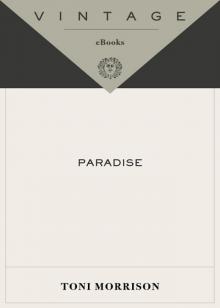 Paradise
Paradise Beloved
Beloved Home
Home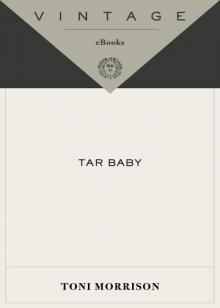 Tar Baby
Tar Baby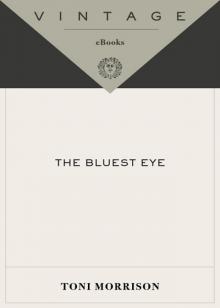 The Bluest Eye
The Bluest Eye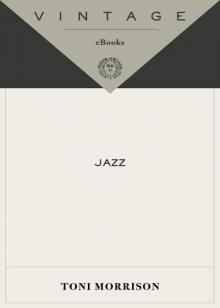 Jazz
Jazz Love
Love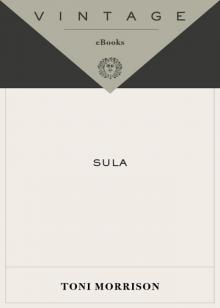 Sula
Sula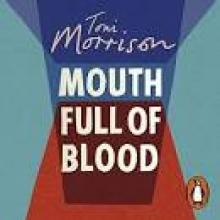 Mouth Full of Blood
Mouth Full of Blood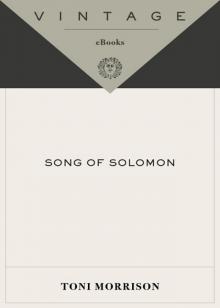 Song of Solomon
Song of Solomon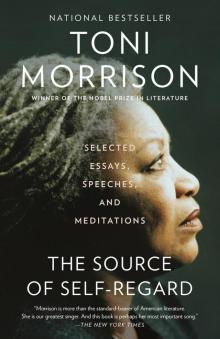 The Source of Self-Regard
The Source of Self-Regard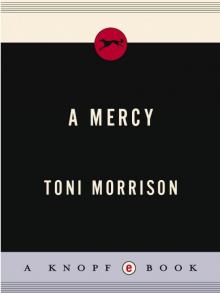 A Mercy
A Mercy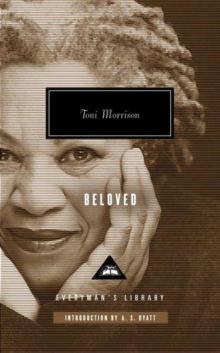 Beloved_a novel
Beloved_a novel